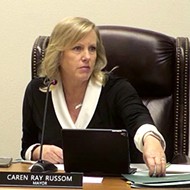Judge and jury
Behind closed doors, a Grand Jury investigation is shrouded in mystery
By Kathy Johnnston[{
"name": "Ad - Medium Rectangle CC01 - 300x250",
"id": "AdMediumRectangleCC01300x250",
"class": "inlineCenter",
"insertPoint": "8",
"component": "2963441",
"requiredCountToDisplay": "12"
},{
"name": "Ad - Medium Rectangle LC01 - 300x250",
"id": "AdMediumRectangleCC01300x250",
"class": "inlineCenter",
"insertPoint": "18",
"component": "2963441",
"requiredCountToDisplay": "22"
},{
"name": "Ad - Medium Rectangle LC09 - 300x250",
"id": "AdMediumRectangleLC09300x250",
"class": "inlineCenter",
"insertPoint": "28",
"component": "3252660",
"requiredCountToDisplay": "32"
}]
For Sarah Christie, it must seem like a textbook example for her graduate-level course, Political Pressure in the Public Policy Arena. Christie takes the heat in the latest report of the SLO County Grand Jury, based on a secret investigation into the workings of the county planning commission on which she serves.
Â
Â
After looking at three recent planning commission decisions—on PG&E’s steam generation project at Diablo Canyon nuclear power plant, a housing development in Nipomo, and the North Coast Area Plan Update—the grand jury recommends that planning commissioners should not discuss or vote on any issue in which they “have a personal interest.�
Their report issued last week singles out Christie with its statement that “there is the appearance of a conflict of interest� when “one of the commissioners is also an employee of the Coastal Commission.� Although the grand jury peppers its report with words like “appears� and “seems,� it charges that the planning commission process is “manipulated by personal agenda.�
The grand jury recommends that the board of supervisors implement sweeping changes, including adding more members to the Planning Commission, eliminating fees for developers to appeal planning commission denials, and prohibiting discussion or votes by planning commissioners with “a personal interest� in an issue.
But a close examination of the grand jury’s own procedures raises questions about whether its members might also have their own “personal interest� or “personal agenda.�
Â
Appointed by judges of the Superior Court, the 19 grand jury members are issued with a manual of procedures to be followed in conducting their investigations and making their reports. This manual specifies that grand jury reports should include the origin of the investigation—a citizen’s complaint, a public official’s complaint, or the grand jury’s own initiative. The method to be used in any investigation, including “who, what, when, where, why,� is also spelled out. “To achieve objectivity, key persons from all sides of an issue must be interviewed,� the manual states. Grand jurors should avoid making recommendations that are policy matters, such as trying to direct Board of Supervisors’ decisions, it says.
Â
According to grand jury foreperson Hedy Damery (the only juror authorized to talk to the media), details about the investigation’s origin and method are “buried in the narrative.� Damery says there was no need to interview any planning commission members: “It’s not about two sides. It’s about the process of the Board of Supervisors. We were not attacking planning commissioners, but the process, the rules, the number of members. We were not saying, ‘So-and-so should be removed.’ We just used the example of personal agendas; they can get in the way.�
Â
Can the “personal agenda� of grand jury members get in the way? “That’s a factor in any grand jury,� Damery notes. “But they have to convince 12 members to support the report. They have to fill out Form 700 Statement of Economic Interest, and they have to recuse themselves if they have an interest.�
Â
And why would someone volunteer to serve on the grand jury’s city and county investigating committee if they didn’t have an interest? “Yes, they have a personal interest, but not a personal agenda,� the foreperson explains.
Â
Christie stands behind her decisions on the Planning Commission, saying, “My ‘personal agenda’ as a volunteer planning commissioner is to use the policies and ordinances in the county’s General Plan and all applicable laws of the state to protect the quality of life in San Luis Obispo County, and to preserve our coastline, our wildlife, and our air and water quality for the benefit of all, to the maximum extent possible.
“That’s why Jim Patterson appointed me; that’s his agenda too,� Christie adds. “He has faith in my abilities to accomplish that to the best of my ability in every single action I take.�
Â
The information in the record and in the findings determines whether a project is in keeping with the law, she says. “My votes are based on the evidence in the record as it applies to the law, period— regardless of who likes or doesn’t like something.�
Â
The State Attorney General and the SLO County Counsel have determined that Christie does not have a conflict of interest just because she works for the Coastal Commission. “I don’t even live in the coastal zone,� she says. “And what do you think, the Coastal Commission isn’t going to pay me if they don’t like the way I vote on something?�
Â
Steve Monowitz, the manager of the Central Coast district office for the Coastal Commission, says he made it clear in a grand jury interview that Christie had nothing to do with the timing of Coastal Commission comments on the Cambria/San Simeon area plan. “I disagree with the way the grand jury report characterizes our conversation,� Monowitz says, adding that the Coastal Commission has “clear rules� about avoiding conflicts of interest.
Â
Christie has clashed with County Planning Director Vic Holanda over some issues at the Planning Commission, but it’s unclear whether Holanda was involved with the grand jury investigation. One of their recommendations, however, is that if the Planning Commission denies a project, the Planning Director is deemed “an interested person adversely affected� and may file an appeal with the Board of Supervisors to overturn the Planning Commission’s decision.
Â
With a guarantee of “rigorously protected� confidentiality, any citizen or public official can file a complaint and ask the grand jury to investigate “after all attempts to correct a situation have been explored and were unsuccessful,� according to the complaint form. If it chooses to look into a complaint, the grand jury conducts its investigation behind closed doors, and grand jurors are sworn to secrecy.
Â
Many of the grand jurors are retired people who have had interesting careers, according to foreperson Damery. She says in previous years it’s been difficult to attract many applicants for the volunteer juror position, but after media attention to the various grand jury reports this year, there are “a lot more applicants.�
Â
However, the deadline for applications, originally set for March 31, has now been extended to April 14 to allow time for “a wider pool� of applicants to come forward, according to the Office of the Jury Commissioner.
Â
If you’re a U.S. citizen over 18 and “of sound mind and fair character,� you’re welcome to nominate yourself by filling out a questionnaire (available online) including information about relevant employment or volunteer work, and a brief personal statement. No information about your “personal agenda� is required. ∆
Award-winning journalist Kathy Johnnston can be reached at [email protected].
Latest in News
Readers also liked…
-

Coast Unified teachers upset over new position's salary and qualifications
Oct 20, 2022 -

SLO police identify alleged driver who hit and killed couple
Dec 22, 2022 -

When the levee breaks: Oceano residents, county officials walk a tightrope of regulations to manage Arroyo Grande Creek, which some say led to the levee's failure in January
May 18, 2023







